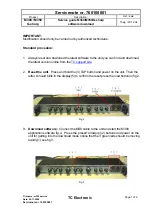
SCPA033
6
PCI1520 Implementation Guide
4
PCI Bus Interface
The PCI1520 has a 33MHz, 32 bit PCI Interface compliant with PCI Local Bus Specification
Revision 2.2.
•
PCLK, AD31:0, C/BE#3:0, PAR, DEVSEL#, FRAME#, STOP#, TRDY#, IRDY#, GNT#,
and REQ# are required PCI signals. All except PCLK, GNT#, and REQ# are bussed
signals. PCLK is a 33MHz point-to-point clock. GNT# and REQ# are point-to-point
signals form the PCI bus arbitrator.
•
PERR#, SERR#, and LOCK# are optional PCI signals. PERR# and SERR# are bussed
signals and should be pulled up to VCC if unused. LOCK# is available on a Multifunction
Terminal. If LOCK# is not needed for system implementation, it should not be configured
as such in the Multifunction Routing register (PCI configuration offset 8Ch).
•
GRST# (Global reset) and PRST# (PCI reset) are both used to initialize the PCI1520.
The assertion of GRST# puts the PCI1520 in its default state. The assertion of PRST#
does not initialize GRST# only bits. PRST# also does not initialize PME# context bits if
PME# in enabled. More information can be found in Section 9.1 – D3 Wake Information.
•
IDSEL should be resistively coupled (100
Ω
) to one of the address lines between AD31
and AD11. Please refer to Section 3.2.2.3.5 (System Generation of IDSEL) and Section
4.2.6, footnote 31 (Pinout Recommendation) of the PCI Local Bus Specification Revision
2.2 for more information.
•
PCI Interrupts can be routed through INTA# and INTB# through the Multifunction
terminals. More information can be found in Section 7 – Interrupt Configurations.
•
PCI CLKRUN# can be routed through Multifunction terminal 6. For more information,
please refer to Section 9 – Power Management Considerations.
•
PME# is used to signal Power Management Events. This signal is important for waking
the PCI1520 from low power states. PME# is an open-drain signal.
•
Pullup resistors are needed on the following PCI terminals: IRDY#, TRDY#, FRAME#,
STOP#, DEVSEL#, PERR#, SERR#, LOCK#, PRST#, GRST#, INTA#, INTB#,
CLKRUN#, and PME#.







































